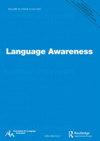小学生元认知知识意识与词汇知识习得:一种潜在增长曲线建模方法
IF 2.2
2区 文学
0 LANGUAGE & LINGUISTICS
引用次数: 7
摘要
摘要本研究探讨了小学儿童如何从一年级到四年级发展他们的元认知知识和词汇知识,以及这两种知识是如何动态关联的。纵向样本包括426名一年级学生(M = 6.6 年,SD=.51;50.2%为男生,49.7%为女生)。一组关于元认知知识和词汇知识的测试在四年内进行了四次。元认知知识一对一测试是基于学生对认知活动的解释;词汇知识测试主要考察学生词汇知识的广度和深度。潜在生长曲线模型用于研究发育变化。结果表明,参与者的元认知知识和词汇知识从一年级到四年级有所提高,但不是以累积的方式提高的。在整个选定的学年中,参与者的元认知知识水平与他们的词汇知识密切相关。在学习期间,词汇知识广度的发展滞后于词汇知识深度。这些发现揭示了小学生元认知知识和词汇知识的发展。本文章由计算机程序翻译,如有差异,请以英文原文为准。
Exploring awareness of metacognitive knowledge and acquisition of vocabulary knowledge in primary grades: a latent growth curve modelling approach
Abstract This study explores how primary school children develop their metacognitive knowledge and vocabulary knowledge and how both types of knowledge are dynamically correlated from 1st to 4th grade. The longitudinal sample included 426 first-grade students (M = 6.6 years, SD = .51; 50.2% boys, 49.7% girls) from five public primary schools in China. A set of tests on metacognitive knowledge and vocabulary knowledge were administered four times over four years. The one-on-one-basis metacognitive knowledge test was based on students’ explanations about cognitive activities; the vocabulary knowledge test focused on students’ breadth and depth of vocabulary knowledge. Latent growth curve modelling was used to study developmental change. Results showed that participants’ metacognitive knowledge and vocabulary knowledge improved from 1st to 4th grade but not in a cumulative fashion. Participants’ level of metacognitive knowledge was strongly associated with their vocabulary knowledge throughout the selected school years. The development of vocabulary knowledge breadth lagged behind vocabulary knowledge depth during the study period. These findings shed light on primary school students’ development of metacognitive knowledge and vocabulary knowledge.
求助全文
通过发布文献求助,成功后即可免费获取论文全文。
去求助
来源期刊

Language Awareness
Multiple-
CiteScore
3.70
自引率
10.00%
发文量
18
期刊介绍:
Language Awareness encourages and disseminates work which explores the following: the role of explicit knowledge about language in the process of language learning; the role that such explicit knowledge about language plays in language teaching and how such knowledge can best be mediated by teachers; the role of explicit knowledge about language in language use: e.g. sensitivity to bias in language, manipulative aspects of language, literary use of language. It is also a goal of Language Awareness to encourage the establishment of bridges between the language sciences and other disciplines within or outside educational contexts.
 求助内容:
求助内容: 应助结果提醒方式:
应助结果提醒方式:


